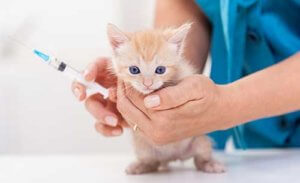Cats

Many cat owners do not bring their cats to the veterinarian regularly. There are several reasons for such avoidance. First, a trip to the veterinarian is an ordeal for cats and their owners. Every step may present difficulty from catching the cat to putting her in the carrier, enduring the car ride, waiting to be seen and the actual physical examination itself.
Even indoor cats need routine examinations, vaccines, blood work and dental cleanings to protect them from serious diseases, some contagious to people, and to enhance their quality of life. Most cats do not openly show signs of disease until the disease can no longer be hidden. For this reason, annual to biannual examinations and diagnostic testing help detect problems early when the chance of correction or successful management is greatest.
Feline Preventative Care
Distemper (FVRCP +C)
 The “distemper” vaccine in cats is a combination vaccine which protects against the major causes of upper respiratory disease and conjunctivitis in cats. These highly contagious diseases, Feline Viral Rhinotracheitis ( also known as feline herpesvirus-1), feline Calicivirus, Panleukopenia ( also called distemper), and Chlamydia are spread by direct contact, sneezing, coughing, eye discharge, and via fomites such as contaminated surfaces, on clothing and on human hands. Kittens are vaccinated with the distemper combination every 3-4 weeks starting at 6-8 weeks of age and continuing until at least 16 weeks of age. This vaccine is boostered annually to every three years based on manufacturer recommendations.
The “distemper” vaccine in cats is a combination vaccine which protects against the major causes of upper respiratory disease and conjunctivitis in cats. These highly contagious diseases, Feline Viral Rhinotracheitis ( also known as feline herpesvirus-1), feline Calicivirus, Panleukopenia ( also called distemper), and Chlamydia are spread by direct contact, sneezing, coughing, eye discharge, and via fomites such as contaminated surfaces, on clothing and on human hands. Kittens are vaccinated with the distemper combination every 3-4 weeks starting at 6-8 weeks of age and continuing until at least 16 weeks of age. This vaccine is boostered annually to every three years based on manufacturer recommendations.
Feline Leukemia
Feline leukemia is a major cause of cat illness and death. The leukemia virus in cats may be spread through any bodily fluid including tears, urine, saliva, and blood. Casual contact such as sharing food and water bowls, playing together, fighting or breeding frequently spread this virus. Not all infected cats show illness, but those who do develop serious diseases and often die. This virus causes various cancers, bone marrow diseases such as anemia and immunosuppression. Immunocompromised cats are then susceptible to additional infections and do not have the ability to fight disease. Kittens are vaccinated with a series of two vaccines and boostered annually based on lifestyle and contact with other cats.
Feline Infectious Peritonitis
Despite its name, FIP does not always cause peritonitis. This virus is nearly always progressive and fatal. FIP is transmitted by any feline bodily fluid, via ingestion, inhalation or on surfaces in the environment. There are two forms of the virus, the “wet” or “dry” form based on the organs affected. The wet form causes fluid to accumulate in the lungs, and the dry form involves the abdominal organs. In either category of FIP, cats suffer and decline rapidly. New kittens and stray kittens should be closely monitored and tested if this disease is suspected.
Rabies
Rabies is a potentially fatal virus. Because this disease is so dangerous and is contagious to people, all cats and dogs must be vaccinated. Even indoor cats need to be protected. Rabies vaccine is given to puppies and kittens 12 weeks of age or older and is effective for one year initially and for 3 years following subsequent vaccines. All dogs and cats are required by law to be licensed annually in the town of residence as proof of rabies vaccination.
Fleas
 Even indoor cats can contract fleas. For those cats who go outside “just on the porch” or “only in the yard”, a flea preventative is imperative. Fleas carry several diseases, some of which are contagious to people. The two most common ailments in cats are intestinal tapeworms, and bartonella (Cat Scratch Fever). Both of these diseases are transmissible to people and can be serious.
Even indoor cats can contract fleas. For those cats who go outside “just on the porch” or “only in the yard”, a flea preventative is imperative. Fleas carry several diseases, some of which are contagious to people. The two most common ailments in cats are intestinal tapeworms, and bartonella (Cat Scratch Fever). Both of these diseases are transmissible to people and can be serious.
In recent years, these parasites are present all year round. Just one unseasonably warm Winter day can assist their survival. Once fleas have entered your home, they may remain dormant for 3-6 months prior to reemerging. Fleas and ticks are best controlled by applying a topical product on the pet’s back once monthly throughout the year to repel and kill fleas, ticks, mosquitoes, in some cases. The liquid medication may be applied at bed time so that no one reduces its effectiveness by petting the pet. These products migrate over the pet’s body and reside in the hair follicles. Excessive bathing or swimming will reduce the effectiveness of these protective products.
Cat Scratch Fever (Bartonella)
All newly acquired cats and those with fleas should be tested for this serious bacterial disease which is also contagious to people. Thirty percent of visibly healthy cats are carriers of bartonella. Other cats, more notably infected, commonly suffer from eye infections, corneal ulcers, respiratory disease, oral infectious and gingivitis. Some additional feline symptoms include vomiting, diarrhea, dermatitis and heart disease. People infected with bartonella may even be hospitalized due to the severity of this illness.
Intestinal parasites
Nearly all puppies and kittens are born with intestinal worms, most commonly roundworms, hookworms, coccidia and giardia. Most puppies and kittens become infected during fetal development. Several types of intestinal parasites may be contracted from the environment via soil, feces, bodies of water and in congested areas such as the parks. Tapeworms are one type of intestinal parasite which are transmitted to your pet by fleas. Routine fecal samples allow us to check your pet for intestinal worms and treat appropriately. Standard hand washing practices and good hygiene will protect you and your family from intestinal parasites.
Vaccine reactions
Although rare, vaccine reactions can be very alarming. Most commonly, your pet will show vomiting, swelling of the face, muzzle and ears, pale gums and lethargy. These signs usually develop within a few minutes to a few hours of a vaccine. A pet can be allergic to one vaccine or a combination of vaccines.
A vaccine is comprised of several ingredients. The antigen, or the disease against which the vaccine is given, adjuvants and preservatives. The additional ingredients protect the efficacy of the vaccine and help the pet to mount a strong immune response. Since vaccines of different types may share the same or similar added ingredients, a pet may react to more than one type of vaccine.
If your pet experiences a vaccine reaction, call the veterinary hospital. Many pets require immediate treatment. Most pets recover readily from an allergic vaccine reaction once treated. Many pet owners become nervous about giving future vaccines, yet the benefit of some vaccines which can cause serious or incurable disease outweighs the risk of a reaction. For future vaccines, your pet is protected by receiving a limited number of vaccines at a time and by being pretreated with medication to reduce the severity and incidence of an allergic vaccine reaction.
More Information on Pet Health
-
Feeding your cat
-
A New Puppy
-
Essential Oils and Your Pet
-
Spaying and Neutering
-
Frequently Asked Questions



